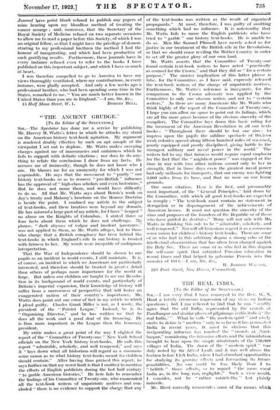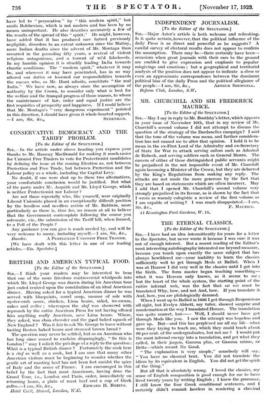THE REAL INDIA.
[To the Editor of the S1'ECIATOR.] S1R,--I am sorry that I have conveyed to the Rev. W. S. Hunt a totally erroneous impression of my views on Indian questions ; but I am relieved to find that he can " readily agree that the old India, represented by the crowds at Pandharpur and similar places of pilgrimage is (his italics) time real India.' " What he calls " the modern spirit " and wisely omits to define is " modern " only in so far as it has permeated India in recent years. It must be obvious that this invigorating influence has touched the " crowds at Paint- harpur," considering the intensive efforts and the intimidation brought to bear upon the simple inhabitants of the 750,000 villages of India. The dawn of the " modern spirit was duly noted by Sir Alfred Lyall, and it was well above the horizon before I left India, where I had abundant opportunities for studying its growing effects and forecasting its future possibilities. • No one could be less likely than I to " belittle " those effects, or to regard " the more vocal India as, in the long run, negligible." Such a view would. I consider, not be " rather ostrich-like " but plainly
Mr. Hunt correctly enumerates sonic of the causes Which have led to " permeation " by "this modern spirit," but omits Bolshevism, which is not modern and has been by no means unimportant. He also describes accurately a few of the results of the spread of this "spirit." He might, however, have added that it has produced race hatred previously negligible, disorders to an extent unknown since the Mutiny, more Indian deaths since the advent of Mr. Montagu than occurred in the preceding fifty years, a revival of violent religious antagonisms, and a torrent of wi!d falsehoods. In my humble opinion it is steadily leading Inlia towards chaotic conditions. The "modern spirit," whatever it may be, and wherever it may have penetrated, has in no way altered our duties or lessened our responsibilities towards the masses who, as Mr. Hunt admits, constitute "the real India." We have now, as always since the assumption of authority by the Crown, to consider only what is best for the welfare and the tranquil progress of those masses, to whom the maintenance of law, order and equal justice are the first requisites of prosperity and happiness. If I could believe that Mr. Montagu's "very dangerous experiment" pointed in this direction, I should have given it whole-hearted support.



























































 Previous page
Previous page